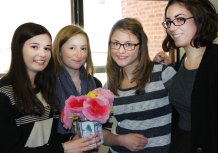
L-R: Kerenza Kerslake, Jenny Laming, Anna-Belle Letten and Ellie Edmondson with their Victorian handicraft
The past and the present: collaborative student workshops in English explore Victorian Material Culture
A series of workshops have been devised to encourage third-year students to engage with Victorian material culture in one of the most direct ways possible – by creating their own.
On Monday 5 November, students studying on the third-year modules The Chamber of Horrors: Victorian Literature and Ornament (EAS3174) at Streatham, and Women's Writing: Romantic to Modern (TRU3018) at the Cornwall Campus, collaborated in a series of research workshops at Streatham.
Tracing the connections between the past and the present, the workshops suggested ways in which the texts and topics the students are studying can be applied to contemporary life. The workshops encouraged students to engage with Victorian handicrafts and used innovative methods to foster group collaboration.
The students were given Victorian handicraft instructions on objects such as patchwork quilts, paper flowers, glass painting, and bead mosaic, and asked to create their own crafts. Working in groups, the students solved problems such as, what to use instead of the required “lead paint” called for in the instructions for glass painting, or what a tool called a “goffer”, used in paper flower making, might actually be. Some students drew on their existing skills of crocheting and knitting, teaching other members of group and sharing their expertise. Others approached craftwork for the first time, putting their skills of cutting and pasting to the test.
Natalie Thielen-Helper, third-year study abroad student from Kenyon College, Ohio, comments, “I like that studying English at Exeter involves a hands-on approach; we aren’t just reading about it, we are doing it, and at the same time getting fresh ideas for collaboration and meeting new people!”
Following a session on material culture led by Professor John Plunkett in the special collections in the Old Library, the group then participated in a lab session equipped with the latest innovative technology. The Forum Exploration Lab 2, a vibrant and stimulating environment, was specifically chosen as the venue for the workshop so that students could share documents and images using the exclusive, multi user, multi touch surface tables. These were designed to encourage collaborative learning and are among the first of their type to be found in any UK university.
The workshops were led by the module leaders of EAS3174 (Dr Patricia Zakreski) and TRU3018 (Dr Kyriaki Hadjiafxendi). This is the first time that the Department of English has tried to foster, through a series of workshops on material culture, archival research and Victorian handicraft, an inter-campus dialogue between its English programmes at the Cornwall and Streatham campuses.
Dr Kyriaki Hadjiafxendi comments, “this is exemplary of the way that the Department of English tries to promote embodied modes of learning, as well as support students' employability across the two campuses.”
The Victorian handicrafts were judged by the Director of the Centre of Victorian Studies, Dr. Paul Young, and PhD candidate at Tremough, Ryan Sweet, an expert on Victorian disability. Dr Young commented, “We were genuinely impressed by the efforts the students had made, as well as with the way in which they drew upon their knowledge of Victorian material culture in order to help them frame and explain the projects. It was quite inspiring.”
First place was awarded to a group who made a Victorian Doll House (TRU3018), second place to the ‘glass jars with crochet tops filled with Victorian sweets’ (TRU3018) and third place to a group who made ‘potichomanie’ – a vase adorned with intricate birds (EAS3174).
Ryan added, “I thoroughly enjoyed judging the session and would strongly encourage the planning of such events in the future. From the perspective of someone like myself, who studied at both campuses, it was great to see the Tremough and Streatham students interacting with one another and engaging in some activities which may facilitate the development of transferable skills which can be applied beyond the classroom.”
The handicrafts will be displayed in the Queen’s Building lobby (near the Margaret Rooms) in a ‘curiosity box’ provided by the Bill Douglas Centre until 7 December. Images of the students’ handicrafts can also be viewed on the College of Humanities Flickr page. For more information about studying English on any of the two campuses of Exeter University, please see the Department of English webpages.
Date: 12 November 2012
